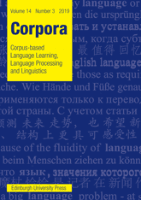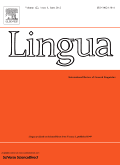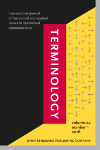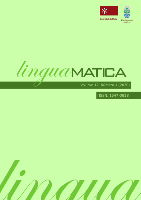
Quaderns de Filologia-Estudis Linguistics
metrics 2024
Fostering Scholarly Dialogue in Linguistics.
Introduction
Quaderns de Filologia-Estudis Linguistics is a distinguished open-access journal published by the Universitat de València, Facultat de Filologia, specializing in the study of linguistics and language. With its ISSN 1135-416X and E-ISSN 2444-1449, this journal has been a valuable resource for scholars in the field since its transition to open access in 2012. Located in Valencia, Spain, it contributes significantly to the discourse within the Linguistics and Language category, currently holding a Q3 quartile ranking as per Scopus. The journal is dedicated to the dissemination of innovative research findings and theoretical discussions, ensuring that both emerging and established scholars have a platform for their work. Its inclusive scope and commitment to quality research help navigate the complex landscape of linguistic studies, making it an essential resource for researchers, professionals, and students alike. With converged years covering from 2019 to 2023, Quaderns de Filologia continues to foster a vibrant academic community, encouraging submissions that advance the field of linguistics.
Metrics 2024
 0.13
0.13 0.20
0.20 0.20
0.20 3
3Metrics History
Rank 2024
Scopus
JCI (Web Of Science)
Quartile History
Similar Journals

Suvremena Lingvistika
Exploring the Boundaries of Language and Thought.Suvremena Lingvistika is a distinguished open-access journal published by the Croatian Philological Society, dedicated to advancing research in the field of linguistics and language. Since its establishment, the journal has been pivotal in promoting scholarly dialogue within the linguistics community, especially among researchers and academics in Croatia and beyond. With an ISSN of 0586-0296 and an E-ISSN of 1847-117X, the journal has transitioned to an open-access model since 2007, ensuring that research is freely accessible to all. As of 2023, it holds a respectable Q3 ranking in the Linguistics and Language category, reflecting its potential contribution to the field. The journal's scope encompasses a wide array of linguistic disciplines, encouraging both theoretical and empirical studies. Supportive of new research, Suvremena Lingvistika aims to foster innovative approaches and methodologies in linguistics, making it an essential resource for students, researchers, and professionals eager to explore the complexities of language. With its ongoing publication until 2024, it continues to shape the linguistic landscape, providing valuable insights and fostering collaboration among scholars globally.

Quaderns-Revista de Traduccio
Navigating the Landscape of Translation and LanguageQuaderns-Revista de Traduccio, published by the Universitat Autònoma de Barcelona, is a prominent journal in the field of Linguistics and Language, which has garnered recognition for its scholarly contributions since its inception. With an ISSN of 1138-5790 and an E-ISSN of 2014-9735, this journal has maintained an active publication schedule across notable cycles, contributing valuable insights from 2011 to 2018 and continuing from 2020 to 2024. As a Q3 category journal in both Arts and Humanities and Social Sciences related to Language and Linguistics, it occupies an important niche, ranking #607 out of 1088 and #692 out of 1167 respectively. Though currently not an open-access journal, its rigorous peer-review process ensures that published articles meet high academic standards, making them relevant for researchers, professionals, and students alike. Housed in Cerdanyola del Vallès, Barcelona, this journal serves as a critical platform for the dissemination of cutting-edge translation studies and linguistics research.

Revista Espanola de Linguistica Aplicada
Advancing linguistic insights for a global audience.Revista Espanola de Linguistica Aplicada is a prominent academic journal published by John Benjamins Publishing Co, specializing in the interdisciplinary fields of linguistics, education, and e-learning. With its ISSN 0213-2028 and E-ISSN 2254-6774, the journal has established a significant presence in Spain and beyond, showcasing innovative research and contributions in applied linguistics. The journal is recognized for its rigorous peer-review process and maintains impressive Scopus rankings, notably within the 72nd percentile for Arts and Humanities and 68th percentile for Social Sciences, reflecting its critical role in advancing the study of language and education. As of 2023, it holds a Q3 rank in Education and a Q2 rank in Linguistics and Language, underscoring its influence and relevance in these disciplines. Targeted at researchers, educators, and students alike, the journal aims to facilitate knowledge exchange and provide a platform for discussions that shape the future of linguistics.

Corpora
Connecting Scholars through Rigorous DiscourseCorpora is a leading journal in the field of Linguistics and Language, published by Edinburgh University Press. Since its inception in 2006, Corpora has established itself as a pivotal platform for scholarly discourse, focusing on the analysis and interpretation of linguistic corpora across various contexts. The journal is recognized for its rigorous peer-review process and boasts a commendable impact within its category, achieving a Q2 ranking in the 2023 Linguistics and Language quartiles. Moreover, it ranks in the 79th percentile in Arts and Humanities Language and Linguistics and in the 77th percentile in Social Sciences Linguistics and Language, underlining its significance in the academic community. While currently not an open-access journal, Corpora is accessible to a broad audience, encouraging contributions from researchers, professionals, and students eager to advance the field of linguistics through innovative research and insightful discourse. For those invested in linguistic studies and corpora analysis, Corpora offers a vital resource and forum for the dissemination of high-quality research.

LINGUA
Unveiling the complexities of language through rigorous scholarship.LINGUA is a premier academic journal dedicated to the field of linguistics, published by ELSEVIER and based in the Netherlands. With an ISSN of 0024-3841 and an E-ISSN of 1872-6135, this esteemed journal has garnered a reputation for excellence, evidenced by its position in the top Q1 quartile in Linguistics and Language as of 2023. LINGUA serves as a vital platform for scholars, researchers, and students, showcasing innovative research and critical discussions across various linguistic subfields. The journal has demonstrated impressive Scopus rankings—151 out of 1088 for Language and Linguistics, and 176 out of 1167 in Social Sciences—placing it in the 86th and 84th percentiles, respectively. By providing a forum for the dissemination of advanced linguistic theories and their applications, LINGUA continues to significantly contribute to the academic community, making it an essential resource for anyone engaged in the study of language.

MACHINE TRANSLATION
Empowering global dialogue through machine translation.MACHINE TRANSLATION, published by Springer, is a premier academic journal dedicated to the interdisciplinary fields of Artificial Intelligence, Linguistics, and Software Development. With its origins dating back to 1989, the journal has played a crucial role in disseminating cutting-edge research and advancements in machine translation technologies. The journal holds a distinguished Q3 ranking in Artificial Intelligence and Q1 in Linguistics and Language for 2023, underlining its relevance and impact in the linguistic and computational research communities. Despite coverage discontinuation in Scopus, it continues to have impressive rank positions in various categories, including 31st percentile for Language and Linguistics and 112th for Artificial Intelligence. Researchers, professionals, and students can access a wealth of impactful articles that explore the latest methodologies, tools, and applications in the domain of machine translation, solidifying its importance for anyone vested in the future of language technology.

REVUE DE LINGUISTIQUE ROMANE
Unveiling the Nuances of Romance LanguagesREVUE DE LINGUISTIQUE ROMANE, published by the esteemed SOCIÉTÉ LINGUISTIQUE ROMANE, is a prominent academic journal dedicated to the exploration of Romance linguistics. With its ISSN 0035-1458, the journal plays a significant role in advancing knowledge within the fields of linguistics and the history and philosophy of science. Although it does not currently offer Open Access, it provides critical insights and peer-reviewed research that are indispensable for scholars, educators, and students interested in the nuances of Romance languages. The journal, which has seen converged coverage from 2006 to 2017, and then again from 2019 to 2021, is ranked in the third quartile (Q3) across various categories within Scopus, reflecting its established presence in the academic community. As a vital resource for interdisciplinary studies, REVUE DE LINGUISTIQUE ROMANE is instrumental for those seeking to deepen their understanding of linguistic structures, cultural nuances, and the historical development of Romance languages.

Terminology
Innovating Terminology Studies for a Connected WorldTerminology is a highly regarded journal published by John Benjamins Publishing Co, focusing on the multidisciplinary fields of communication, library and information sciences, and linguistics. Since its inception, the journal has provided a platform for rigorous research and innovative discussions surrounding the theory and practice of terminology, shedding light on its significance in effective communication and knowledge organization. With its Q2 ranking in the 2023 quartiles for communication and linguistics, and an impressive 78th percentile ranking in language and linguistics according to Scopus, Terminology stands as an influential resource for scholars and practitioners alike. Although not an open access journal, it is committed to enhancing the visibility and dissemination of critical academic work. The journal's comprehensive scope includes empirical studies, critical reviews, and theoretical explorations from 1994 to 2024, making it a vital resource for researchers, professionals, and students seeking to advance their understanding of linguistic practices and terminological challenges in an increasingly interconnected world.

Linguamatica
Pioneering New Perspectives in Linguistic Studies.Linguamatica is a prominent open-access journal published by UNIV MINHO, INST EDUCACAO, CENTRO INVESTIGACAO EDUCACAO in Portugal, with the objective of advancing the field of linguistics and language studies. Since its establishment in 2009, the journal has served as a vital platform for disseminating high-quality research and innovative studies in linguistics, emphasizing both theoretical and applied perspectives. With an impressive Scopus ranking placing it in the 76th percentile in Arts and Humanities and the 73rd percentile in Social Sciences, Linguamatica is recognized for its significant contributions and rigorous peer-review process. The journal's commitment to open-access publishing ensures that research findings are accessible to a wider audience, fostering collaboration and knowledge sharing among researchers, professionals, and students. Located at CAMPUS GUALTAR, BRAGA 4710, PORTUGAL, Linguamatica aims to be a leading source of valuable insights in linguistics, covering a diverse array of topics from language acquisition to sociolinguistics, thereby playing a crucial role in shaping contemporary language research.

Germanoslavica-Zeitschrift fur Germano-Slawische Studien
Cultivating Understanding at the Crossroads of CulturesGermanoslavica-Zeitschrift für Germano-Slawische Studien, published by the esteemed SLOVANSKY USTAV AKAD CESKE REPUBLIKY, serves as a pivotal platform for scholarly discourse in the fields of linguistics and literary studies. Since its inception in 2002, this journal has dedicated itself to exploring the intricate relationships between German and Slavic languages and literatures, fostering a greater understanding of this culturally rich intersection. With its publication indexed in Scopus and categorized in the Q4 quartile for Linguistics and Language as well as Literature and Literary Theory, it provides valuable insights at the junction of these disciplines. Although it currently does not have open access options, the journal's commitment to quality research ensures it remains a respected resource for researchers, professionals, and students alike. The journal’s dedication to advancing knowledge makes it an essential reference point for those investigating the complexities of Germano-Slavic interactions.